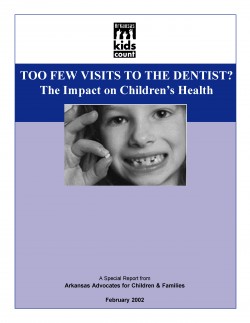
Although dental disease is preventable, dental decay is still the most common and costly preventable oral health problem in all age groups. Poor oral health conditions originate in childhood and can worsen without proper care and treatment.
Oral health in Arkansas is in a dire state. Arkansas was recently graded “D,” along with nine other states. Forty other states were graded “C-” or above. The cost of oral disease prevention is trivial compared to the cost of treating oral diseases. The average cost of sealing a tooth against decay is $20. The average cost of one filling – to repair a decayed tooth – is $66. These are affordable prevention meaures. Arkansas can no longer use “poor and rural state” as an excuse to avoid addressing barriers to oral health. Although oral health care is an integral part of overall health care, Arkansas children still face major obstacles in accessing oral health care. Problems faced by the general child population are:
- The number of uninsured children is increasing, especially in families with mid-level incomes. Most private health insurance plans have limited or no dental coverage and do not have oral health parity.
- Insured children with dental coverage still face an additional barrier – getting an appointment with the local dentist. This issue is more pronounced in the Medicaid population, since most dentists (64%) do not accept this type of insurance.
Although Arkansas’ oral health indicators seem only slightly worse in comparison to national indicators, the true state of oral health in Arkansas is reflected in how these indicators compare to the goals of Healthy People 2010. Healthy People 2010 is a set of health objectives for the nation to achieve in the next 10 years. The initiative challenges individuals, communities and professionals to take specific steps to ensure that good health and long life are enjoyed by all. It is a project of the federal Department of Health and Human Services.
The indicators measure the state averages to rural and urban differences to show the prevalence of poor oral health in children. The significant inequity in rural-urban access to oral health care in Arkansas implies rural oral health indicators will be significantly worse off. And, as with any other health issue, children with disabilities are at even greater risk for having problems with oral health and access to care.
Currently, Arkansas has no state oral health plan, but the Arkansas Health Department Office of Oral Health is considering the development of one
